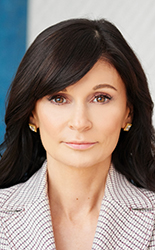S&P Global Offerings
Featured Topics
Featured Products
Events
S&P Global Offerings
Featured Topics
Featured Products
Events
S&P Global Offerings
Featured Topics
Featured Products
Events
Banking & Capital Markets
Economy & Finance
Energy Transition & Sustainability
Technology & Innovation
Podcasts & Newsletters
Banking & Capital Markets
Economy & Finance
Energy Transition & Sustainability
Technology & Innovation
Podcasts & Newsletters
S&P Global Offerings
Featured Topics
Featured Products
Events
13 Jan, 2022
➤ Utilizing emerging technologies in fashion has allowed talent to make a lasting impact on their brands and followers, says Elite World Group CEO Julia Haart.
➤ Avatars of EWG's talent and other "metaverse" technologies have played a big role in the success of one of EWG's major clients, Steve Madden.
➤ To create a healthier, more inspirational social media environment, Haart teaches her talent to use social media to campaign for causes they care about — and she says Congress can help in these efforts, too.
The fashion industry's legacy talent titan has gone virtual like never before.
Julia Haart, CEO and co-owner of the world's first talent media company Elite World Group and star of Netflix Inc. show "My Unorthodox Life," has spent the last two years digitizing the talent management playing field. Hopping on the metaverse technology train years before Facebook announced its rebrand to Meta Platforms Inc., EWG has begun to utilize virtual avatars, as well as virtual and augmented reality technology to bolster its footing in the world of fashion, allowing talent of all kinds — models, influencers and artists — broaden their reach and impact.
Haart, who sits at the center of an elite fashion empire and social media landscape, also wants to reshape the way we view influential people on social platforms. She thinks EWG can build a more inspiring social media landscape, and that Congress should help us get there.
S&P Global Market Intelligence spoke with Haart about EWG's emerging technology efforts and how to make social networks safer and more inclusive. What follows is an interview that has been edited for length and clarity.
 Elite World Group CEO Julia Haart Source: Elite World Group |
S&P Global Market Intelligence: You've previously called Elite World Group a talent agency that has transitioned into a "media powerhouse." What does this mean and how does that work?
Julia Haart:
The idea is to have talent shift their story so that they can build their brands into a network, and so that when they're 70 or 80, they can monetize on the time that they're in the public eye. The first step was to bring in what every network has: producers, directors and photographers to help our talent craft their stories and put the power dynamic squarely in their shoes. The second part of that was to utilize technology. The first version of that has been the internet, like influencers and social media — that gives them longevity. But let's say you're a singer and you have an audience that's been listening to your voice for the last 30 years. You also have a family. What do you leave your children? Your money and your wealth, but imagine if you could leave your children literally yourself. What if that singer could be singing songs 300 years from now?
Utilizing avatars and other emerging technologies like virtual reality in fashion seems to lend itself to the "metaverse" concept that we've been hearing lately, especially since Facebook rebranded to Meta.
I find this to be so interesting. Prior to Facebook coming out and announcing it, when I talked about the metaverse and avatars, everyone thought I was crazy.
Luckily for us, we decided to do it anyway, even though most people had no understanding of it. But to me, it was an obvious evolution. What is very unique about going virtual is that you need to have artistry. The group of people who have the technical wherewithal to create hyper-realistic avatars is minuscule. It's such a new and nascent industry. Combine that with people who actually understand taste, fashion and luxury — that group becomes almost non-existent. What we've done is brought in the most extraordinary experts in creating avatars and world they inhabit and the products they utilize.
Talk about some of the financials involved here. How has all of this helped EWG generate revenue for its talent or brands?
There are some fantastic statistics. There was a Big Commerce report saying that AR technology increases consumer engagement by 66%.
You may have also heard of our Steven Madden Ltd. campaign. During their third-quarter earnings, they credited our virtual campaign for them as the sole reason for the record sales year they had. We conceived, built and produced the entire campaign. It was a first-of-its-kind experience with virtual avatars. We digitized products that you could try on using augmented reality in their interactive e-commerce site. We created Instagram filters. It went viral. It's not just melding fashion and technology, it's melding fashion, technology and communication.
The difficulty with selling things online is that there's no experiential factor. People love to hear their name. They love to walk into a store and hear a salesperson say, "Oh, you look so beautiful!" That is typically missing from an online shopping experience. With what EWG is doing, it becomes utterly interactive and experiential. We have a brand partnership that we're officially announcing in a few months, and we're creating an entire virtual dressing room for them on their website. You can have an avatar salesperson help you "try things on" and design your own things.
Thinking about emerging technology adoption within EWG, what would you say to someone in the talent industry that fears the use of this technology? And what future tech are you the most excited about?
To me, technology is a tool; it is neither good nor bad, dangerous nor useful. It's how you utilize it. To all of us leaders at EWG, this is a massive democratization of fashion and an evolution of advertising that is forced to be more organic, believable and truthful because the person is selling the product. It forces advertising to become more honest. Whether people like it or not, innovation is part of life. So instead of being afraid of the new, we should figure out ways to utilize technology in the service of people. This gives people a voice.
To your second question, we have started embedding our avatars with more artificial intelligence and machine learning functionality. By the time we get there, not only will your avatar walk, talk, look or sound like you, but over time, your avatar will learn to think like you, too.
A key
It's a very complex subject. What we're doing at EWG does not solve the problem, but it certainly helps. What we're training our talent to do is instead of posting bikini shots all day long, we are bringing in experts to help them utilize social media for what I call their "angel product space." It's not a physical product. What we help them do is isolate that which makes them unique, something that they care more about than anything else.
Instead of putting hot shots of you on a beach, we help you to send a message through your social channels. To me, if we can utilize social media as a mode of honest conversation, if we can bring people together to tell the world about their true selves, that is the democratization of everything.
On the receiving end, how does this translate back to regular people who see this stuff, specifically teenage girls?
They learn from the talents they follow. They see their talent posting about real issues, like saving the environment. I have people who have children who are autistic that have created foundations doing extraordinary acts of kindness that no one knows about. When a young girls sees her favorite model, actress or tennis player not shooting bikini shots or talking smack about someone, but utilizing her social media to enact positive change, she's gonna follow suit and do the same.
Do you think it's in our best interest to have Congress regulate social media to make it safer?
I absolutely think Congress should legislate it. We're on the same mission. We're on a mission to change social media from a place that causes harm to a place that can create connectivity, authenticity and organic storytelling in a way that has never been done before. I would welcome those laws because they fall very well into what we're doing. Now, I'm not a politician. I'm a businesswoman, but we're trying to transform social media into a place that builds people up, not tears them down.

